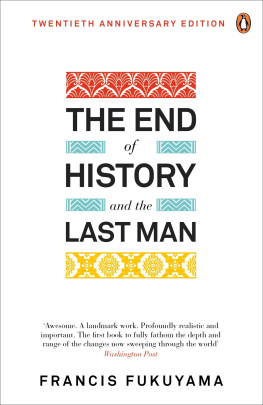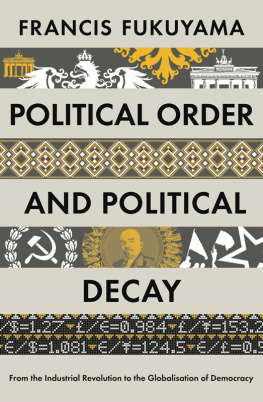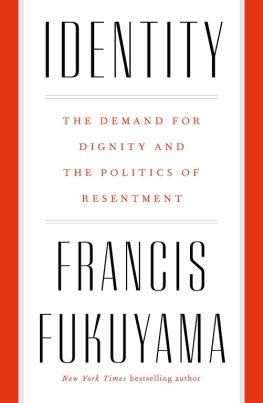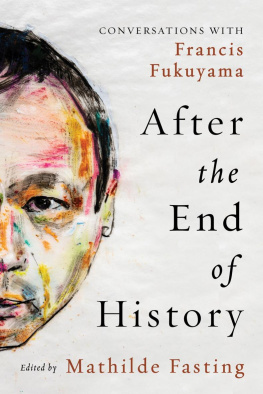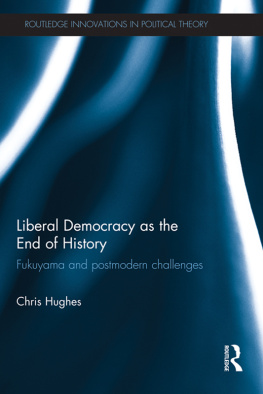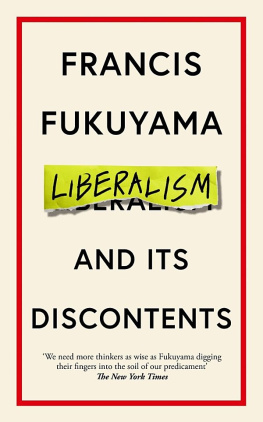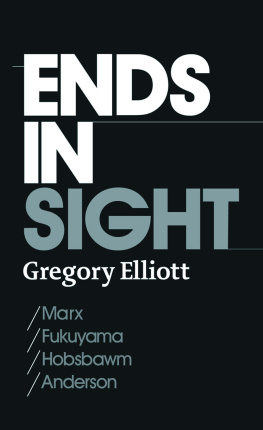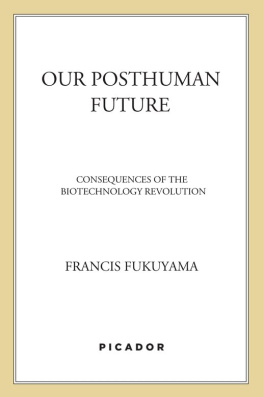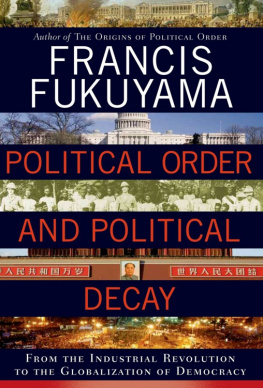Contents
Francis Fukuyama
THE END OF HISTORY AND THE LAST MAN
PENGUIN BOOKS
UK | USA | Canada | Ireland | Australia
India | New Zealand | South Africa
Penguin Books is part of the Penguin Random House group of companies whose addresses can be found at global.penguinrandomhouse.com.
First published in the USA by The Free Press 1992
First published in Great Britain by Hamish Hamilton 1992
Published in Penguin Books 1992
Reissued in this edition 2012
Copyright Francis Fukuyama, 1992
All rights reserved
The moral right of the author has been asserted
ISBN: 978-0-141-92776-3
THE BEGINNING
Let the conversation begin
Follow the Penguin Twitter.com@penguinUKbooks
Keep up-to-date with all our stories YouTube.com/penguinbooks
Pin Penguin Books to your Pinterest
Like Penguin Books on Facebook.com/penguinbooks
Listen to Penguin at SoundCloud.com/penguin-books
Find out more about the author and
discover more stories like this at Penguin.co.uk
ABOUT THE AUTHOR
Francis Fukuyama grew up in New York City, attended Cornell University and received his PhD in Political Science from Harvard University.
First published in 1992, The End of History and the Last Man is an international bestseller and has been translated and published in many languages. Fukuyama is also the author of Trust: The Social Virtues and the Creation of Prosperity, The Great Disruption: Human Nature and the Reconstitution of Social Order, Our Posthuman Future: Consequences of the Biotechnology Revolution, State-Building Governance and World Order in the Twenty-first Century, After the Neo Cons: Where the Right Went Wrong and, most recently, The Origins of Political Order.
Francis Fukuyama is currently Olivier Nomellini Senior Fellow at the Freeman Spogli Institute for International Studies, Stanford.
To Julia and David
PENGUIN BOOKS
THE END OF HISTORY AND THE LAST MAN
Why should we think that history (or, as Fukuyama prefers to call it, History) has a direction at all, let alone a final resting-place? In The End of History and the Last Man, he answers that question by means of a rather subtle balancing trick Noel Malcolm, Sunday Telegraph
Fukuyama has undoubtedly written a clever and important book, teeming with original ideas Piers Brendon, Mail on Sunday
He is a lively, if somewhat tendentious, commentator on current affairs Many of his readers will recoil at the breathtaking ethnocentricity which can regard late twentieth-century America as the final culmination of human achievement or treat the last two centuries as a reliable guide to the future pattern of the whole of human history Keith Thomas, Observer
Quixotic and tightly argued His book deserves respect William H. McNeill, The New York Times Book Review
Like an updated de Tocqueville, Fukuyama is both fascinated and appalled by the extension of democratic egalitarianism Fukuyamas writing is an expression of the sentiment of a great liberal cause [He] has tried to rescue optimism by linking it with an elegiac nostalgia for aristocratic society but there are also less narcissistic ways of expressing optimism, and they include being just relatively proud of where History has got us, rather than completely convinced that we are right Harold James, The Times
Brilliantly argued and scholarly Norman Lucas, Daily Mail
By Way of an Introduction
The distant origins of the present volume lie in an article entitled The End of History? which I wrote for the journal The National Interest in the summer of 1989. In it, I argued that a remarkable consensus concerning the legitimacy of liberal democracy as a system of government had emerged throughout the world over the past few years, as it conquered rival ideologies like hereditary monarchy, fascism, and most recently communism. More than that, however, I argued that liberal democracy may constitute the end point of mankinds ideological evolution and the final form of human government, and as such constituted the end of history. That is, while earlier forms of government were characterized by grave defects and irrationalities that led to their eventual collapse, liberal democracy was arguably free from such fundamental internal contradictions. This was not to say that todays stable democracies, like the United States, France, or Switzerland, were not without injustice or serious social problems. But these problems were ones of incomplete implementation of the twin principles of liberty and equality on which modern democracy is founded, rather than of flaws in the principles themselves. While some present-day countries might fail to achieve stable liberal democracy, and others might lapse back into other, more primitive forms of rule like theocracy or military dictatorship, the ideal of liberal democracy could not be improved on.
The original article excited an extraordinary amount of commentary and controversy, first in the United States, and then in a series of countries as different as England, France, Italy, the Soviet Union, Brazil, South Africa, Japan, and South Korea. Criticism took every conceivable form, some of it based on simple misunderstanding of my original intent, and others penetrating more perceptively to the core of my argument.the Chinese communist crackdown in Tiananmen Square, and the Iraqi invasion of Kuwait as evidence that history was continuing, and that I was ipso facto proven wrong.
And yet what I suggested had come to an end was not the occurrence of events, even large and grave events, but History: that is, history understood as a single, coherent, evolutionary process, when taking into account the experience of all peoples in all times. This understanding of History was most closely associated with the great German philosopher G. W. F. Hegel. It was made part of our daily intellectual atmosphere by Karl Marx, who borrowed this concept of History from Hegel, and is implicit in our use of words like primitive or advanced, traditional or modern, when referring to different types of human societies. For both of these thinkers, there was a coherent development of human societies from simple tribal ones based on slavery and subsistence agriculture, through various theocracies, monarchies, and feudal aristocracies, up through modern liberal democracy and technologically driven capitalism. This evolutionary process was neither random nor unintelligible, even if it did not proceed in a straight line, and even if it was possible to question whether man was happier or better off as a result of historical progress.
Both Hegel and Marx believed that the evolution of human societies was not open-ended, but would end when mankind had achieved a form of society that satisfied its deepest and most fundamental longings. Both thinkers thus posited an end of history: for Hegel this was the liberal state, while for Marx it was a communist society. This did not mean that the natural cycle of birth, life, and death would end, that important events would no longer happen, or that newspapers reporting them would cease to be published. It meant, rather, that there would be no further progress in the development of underlying principles and institutions, because all of the really big questions had been settled.

